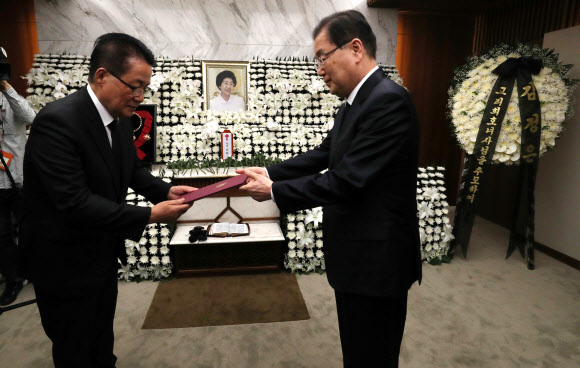 |
|
Kim Yo-jong, first vice director of the Workers’ Party of Korea and younger sister of North Korean leader Kim Jong-un, delivers a condolence wreath to Chung Eui-yong, director of the Blue House National Security Office, and Park Jie-won, lawmaker with the Party for Democracy and Peace, as an expression of North Korea’s sympathy regarding the death of former first lady Lee Hee-ho. (provided by the Unification Ministry)
|
Observers speculate on reason why sympathy delegation was not sent
North Korean leader Kim Jong-un chose to respond to the death of Lee Hee-ho, chair of the Kim Dae-jung Peace Center, by having his sister Kim Yo-jong, first vice director of the Workers’ Party of Korea (WPK), deliver a sympathy floral wreath and a message of condolence. This disappointed some observers, who’d hoped for the kind of high-level sympathy delegation that was sent to South Korea after the death of former South Korean president Kim Dae-jung, Lee’s husband, on Aug. 18, 2009, and the death of Chung Ju-young, founder of the Hyundai Group, on Mar. 21, 2001. Others are more generous in their assessments, arguing that Kim Jong-un did his best to show respect by selecting Kim Yo-jong, his own flesh and blood and his de facto chief of staff, to personally deliver the wreath and message. While that’s not enough to create a breakthrough in the ongoing deadlock in inter-Korean relations, neither is it the kind of silence or apathy that could have cast a pall on relations. This can be regarded as a compromise that Kim settled on after considerable thought. The sympathy wreath and message of condolence signed by Kim Jong-un were brought to Tongilgak, a building in the North Korean half of Panmunjom, at 5 pm on June 12 by Kim Yo-jong. The wreath and message were received there by Chung Eui-yong, director of the Blue House National Security Office; Suh Ho, Vice Minister of Unification; and Park Jie-won, lawmaker with the Party for Democracy and Peace (PDP) and head of the committee organizing Lee Hee-ho’s funeral. Park Jie-won reported that Kim Jong-un’s message of condolence read as follows: “Lee Hee-ho, along with former president Kim Dae-jung, devoted herself to working for the reconciliation and unity of the Korean people and the peace and unification of the nation, in the face of various hardships and adversity. That has laid a precious foundation for the current movement in inter-Korean relations toward independent unification and prosperity, and she will never be forgotten by the Korean people.” “Having heard the tragic news of the death of Lee Hee-ho, wife of former president Kim Dae-jung, I would like to express my heartfelt condolences and extend consolation to her bereaved family,” Kim Jong-un also wrote in the message. Kim Yo-jong said that her brother felt particular affection for the deceased and had asked his sister to personally communicate his condolences to leading figures in South Korea, according to Yoon Do-han, the Blue House senior secretary for public communication. Chung Eui-yong also said that Kim Yo-jong had indicated that she hopes South and North Korea will continue cooperating to honor the wishes of Lee Hee-ho, who had dedicated herself to the nation’s harmony and cooperation. The 15-minute conversation between Chung and Kim Yo-jong, which began at 5 pm, was the first public interaction between high-ranking officials from South and North Korea since talks broke down in the second North Korea-US summit, held in Hanoi this past February. Answering a question from reporters, Chung said that no letters had been exchanged between Kim Jong-un and South Korean President Moon Jae-in. “Today, both sides were focused on honoring and commemorating the deceased,” Chung said. But the fact that Yun Geon-yeong, director of the Blue House Governance Situation Room and one of Moon’s closest aides, accompanied Chung raises the possibility that a message from Moon was conveyed to Kim Jong-un. Yoon Do-han also hinted at that possibility. In response to repeated questions, he said he could only talk about the delivery of the sympathy wreath and message, without explicitly saying that no message had been delivered. On the North Korean side, Kim Yo-jong was accompanied by Ri Hyon, an official at the WPK United Front Department. There are likely two reasons why Kim decided against sending a high-ranking sympathy delegation to South Korea to show his condolences, despite South Korean expectations. First, there may have been practical doubts about the effectiveness of sending such a delegation; second, there may have been formal considerations about the status of the deceased.
 |
|
At the funeral service for former first lady Lee Hee-ho, Chung Eui-yong, director of the Blue House National Security Office, delivers a message of condolence from North Korean leader Kim Jong-un to Park Jie-won, lawmaker with the Party for Democracy and Peace, on June 12. (Yonhap News)
|







